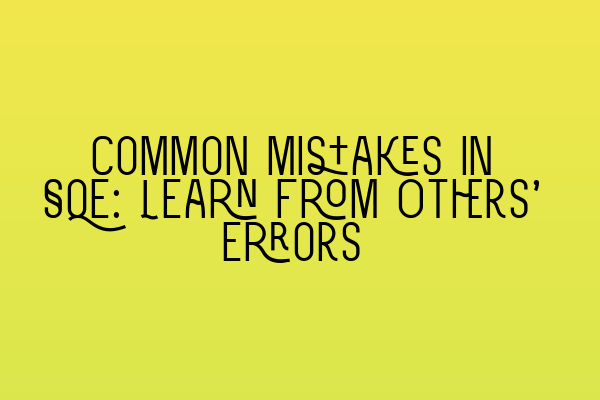Common Mistakes in SQE: Learn From Others’ Errors
Preparing for the Solicitors Qualifying Examination (SQE) is no easy feat. It requires dedication, hard work, and a thorough understanding of the law. However, even the most diligent of students can make mistakes along the way. In this blog post, we will explore some common mistakes made by aspiring solicitors during their SQE journey, and how you can learn from these errors to enhance your own chances of success.
1. Lack of Proper Preparation
One of the biggest mistakes made by SQE candidates is not dedicating enough time to preparation. It’s crucial to invest sufficient time and effort in studying the relevant legal concepts and practicing past papers. To ensure success, make use of essential tips and resources for SQE preparation, such as those found in this informative article: SQE Prep: Essential Tips and Resources for Success in Property Practice. This will help you build a strong foundation and improve your overall performance in the exam.
2. Neglecting Mock Tests
Mock tests are an invaluable tool for SQE candidates. They allow you to assess your understanding of the subject matter, identify areas of weakness, and practice time management. Interactive SQE mock tests, like the ones available in this article, Interactive SQE Mock Tests for Property: Sharpen Your Skills for Exam Success, can provide a realistic exam simulation and help you familiarize yourself with the exam format.
3. Inadequate Knowledge of Specific Topics
Being well-versed in all necessary legal areas is essential for success in the SQE. For example, if you’re focusing on property law, it’s crucial to have a comprehensive understanding of residential leases. Be sure to read this in-depth article on residential leases to bolster your knowledge: An In-Depth Look at Residential Leases. Additionally, don’t overlook key topics like joint ownership and commercial leases, as they frequently appear in SQE exams. Gain insights into these areas by reading these useful articles: Joint Ownership: Legal Considerations for Co-Owners of Property and Commercial Leases: Essential Insights for Business Premises.
4. Lack of Time Management
Time management plays a crucial role in the SQE. Many candidates struggle with completing the exam within the allotted time. To avoid falling into this trap, it’s important to practice proper time management techniques during your preparation. Set clear goals, develop a study schedule, and practice working within time constraints.
5. Neglecting Legal Writing Skills
Strong legal writing skills are essential for success in the SQE. Many candidates overlook the importance of practicing and refining their writing skills. It’s crucial to develop the ability to convey complex legal concepts clearly and concisely. Work on your legal writing skills by practicing writing essays, case summaries, and legal opinions. Seek feedback from mentors or tutors to help improve your writing style.
Conclusion
Preparing for the SQE can be challenging, but by learning from the mistakes of others, you can enhance your chances of success. Avoid common pitfalls by dedicating sufficient time to preparation, making use of mock tests, building a comprehensive knowledge of specific topics, managing your time effectively, and honing your legal writing skills. By following these strategies, you’ll be well on your way to achieving success in the SQE and embarking on your career as a solicitor.

Leave a Reply